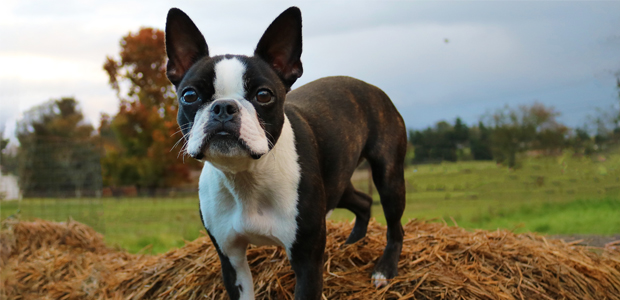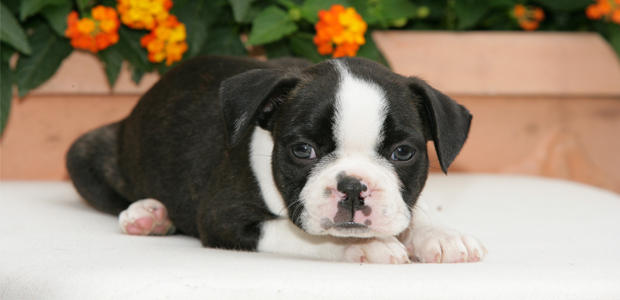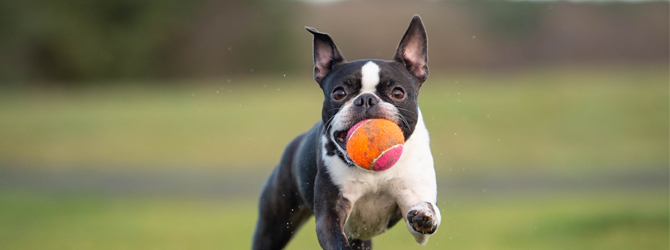Boston Terrier: is it the right breed for you?
The Boston Terrier is an affectionate and friendly dog, known for its eccentricity and lively behaviour. Originating in the 19th Century as a cross between an English Bulldog and an English Terrier, the Boston terriers were originally a much larger dog.
As their name suggests, they first appeared in Boston, USA and have gone on to become popular dogs on both sides of the Atlantic.
Boston Terrier Summary:
- Lively & eccentric breed
- Common colours include white and black, brindle or dark brown.
- Boston Terrier life expectancy = 12 - 15 years
- Average size = 23 - 38 cm
- Average weight = 4 - 11 kg
- Estimated monthly cost = Medium
- Exercise needs = Medium
- Attention needs = High
- Sociability = Medium
Please note: A dog’s exercise, training/stimulation and grooming requirements can depend on several factors such as age and health. The same goes for ongoing costs of ownership. For advice on one specific dog, we always advise chatting with a vet.
How much exercise do Boston Terriers need?
Boston Terriers are high-energy dogs and will need around one hour of exercise every day. If your Boston Terrier is under-exercised, they can be prone to destructive behaviour, so it’s important that they get the right amount of exercise – or your furniture might end up paying the price!
For small dogs, they’ve got lots of energy, so you can split their daily exercise into two walks to tire them out. To keep them happy and healthy, take them to a secure environment where they can run off-lead, with lots of interesting things to see and sniff.
Boston Terrier dietary requirements
Your Boston Terrier will need a balanced diet rich in nutrients, vitamins, and minerals. It’s best to feed them complete dog food to ensure that they are getting the right amount of vitamins and nutrients.
Growing pups may prefer 3-4 smaller servings during the day, rather than two larger meals. This can be reduced to two meals a day as your dog gets older.
The recommended portion size will depend on your individual dog. You’ll need to take into account their activity level, age, and metabolism. To avoid weight gain, make sure your Boston Terrier has a healthy and balanced diet and gets plenty of exercise.

Training: how to train a Boston Terrier
Boston Terriers are intelligent dogs that enjoy pleasing their owner, but their temperament and high prey drive means that they can get distracted easily. Keep their training sessions short and different each time, begin when they are young and always use positive reinforcement.
Boston Terriers are a social breed and enjoy human interaction and playing with other dogs. They will benefit from socialising from an early age and attending puppy socialization classes and dog training.
As is the case with all breeds, Boston Terriers will start to approach new experiences with caution when they are around 12 weeks old. Therefore, it’s really important for their development that they experience as many different situations as possible.
Whilst they are still so young and receptive, it's a good idea to introduce your Boston Terrier to other dogs, people, and livestock as well as car travel and unfamiliar noises, such as traffic.
Affection dogs who love cuddling and human interaction, Boston Terriers can be prone to developing separation anxiety. It’s good practice to leave them on their own for small periods during training so that they can get used to being by themselves.
Grooming: do Boston Terriers shed?
Thanks to their short coat, Boston Terriers don’t moult that much and will only moderately shed their hair. Their coats are easy enough to keep in tip-top condition – 1 brush per week should do the trick, and you’ll only need to bathe your Boston if they get muddy.
Complete your Boston Terrier’s grooming routine with regular tooth brushing, nail clips and ear checks.
Cost of owning Boston Terrier
When considering the lifetime cost of owning a Boston Terrier, remember to take into account the following costs:
- Boston Terrier food and diet needs
- Veterinary care
- Pet insurance
- Kennels or dog sitters for Boston Terriers
- Regular dog grooming costs
- Dog toys and equipment
- Preventative healthcare
As a rough guide, allow between £80 and £90 a month to cover the ongoing costs of owning a Boston Terrier. Our vets have drawn up this handy guide to save dog owners money.
Are Boston Terriers prone to any health problems?
Boston Terriers are prone to certain health problems, just like all breeds. This doesn’t mean your dog is guaranteed to contract any particular disease – it’s just something to bear in mind.
As brachycephalic dogs, Boston Terriers are on average more susceptible to a range of health problems than other breeds. They may require surgery to open their airways and improve their breathing. For more information on brachycephalic breeds, contact your vet.
To keep your Boston Terrier as healthy as possible, monitor them closely and attend routine 6-month health checks with your vet. This will allow the vet to give your dog a thorough check-up and to pick up on minor (often symptomless) conditions before they have a chance to escalate into something worse.
Possible health complications for Boston Terriers include:
- Breathing issues associated with brachycephaly
- Dog dental issues and disease
- Infections
- Canine obesity and weight gain
- Allergies in dogs (including fleas, food and pollen)
- Eye problems
- Mange in dogs
- Hypothyroidism
Before welcoming a new dog into your household, make sure you’re able to cover the costs of any routine or emergency medical treatment they may need. Pet insurance will help massively with this. Why not ask your vet about their recommended pet insurance policy?
Read more: Canine brachycephaly: breathing problems in brachycephalic dogs.

Boston Terrier temperament, socialising and ideal home environment
Boston Terriers make for great family pets and are known for their affectionate nature and bursts of energy. They love human interaction and like to be doted on. They are perfectly happy in smaller homes and apartments providing their exercise needs are met.
Because of their high prey drive, they might not always get on well with other pets, such as cats or rabbits. However, if they are introduced to other animals from a young age, they can live happily alongside other pets.
One of the things to bear in mind when deciding whether to get a Boston Terrier is that they can become really attached to their family. This means that they can display separation anxiety when they are left on their own.
Are Boston Terriers suitable for first time owners?
Boston Terriers are a great choice for first time dog owners because they are so amenable, intelligent, and loving by nature.
They are happy in most environments and get on well with children. Although they have a high prey drive, they will generally get on well with other pets.
Because of their affectionate nature, they can be prone to developing separation anxiety, so they might not be the best breed if you spend lots of time away from home.
Need more info?
For more info on finding the best dog breed for you and your lifestyle, have a chat with your vet. Find your nearest vet using our Find a Vet page.

